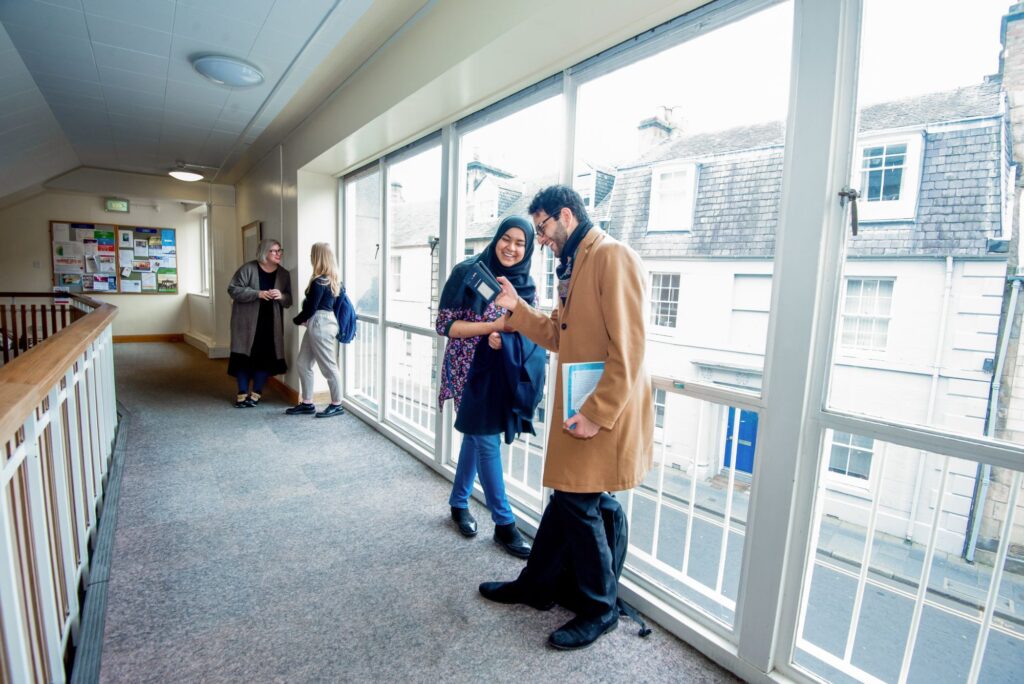About the toolkit
Who is this toolkit for?
This toolkit is intended as a professional development resource for teachers of any language.
What does the toolkit consist of?
The toolkit consists of audio recordings of extended discussions about the following five concepts that are of great relevance to language teachers:





(Images from University of St Andrews)
- Language – What, in fact, is language? How is this term usually defined, and how might a deeper understanding of what language is impact on how it is taught?
- Dynamicity (Dynamicity in language) – In what ways is language variation dynamic? How can recognition of the dynamic nature of language variation impact on how we measure proficiency? And therefore also on how we help language learners to achieve higher levels of proficiency?
- Ideology (Ideology in language teaching materials) – How do language teaching materials promote particular values and ideologies? What impact might this have on the learners (and teachers) who use these materials? How can language teaching practitioners develop sensitivity to the promotion of ideology through materials, and what steps can they take to address issues they uncover?
- Decolonisation (Decolonisation of the language class) – What is meant by the term “decolonisation”? Why would a language teaching practitioner want to decolonise their class, and how should they go about doing this? What impacts might this type of action have?
- Identity (Language teacher identity) – Why is teacher identity important? Are categories such as “native speaker” meaningful or helpful in the context of language teaching, and how might these terms interact with teacher identity? How can language teachers use reflection to better understand their own identities, and what impact might greater understanding in this area have?
Each discussion starts with a “deep dive” into the concept, followed by consideration of how an understanding of the concept might impact language teaching practice. The five concepts are intended to form a conceptual “toolkit” that language teaching practitioners can use to analyse and enhance their own teaching practice.
Why these concepts?
The list of concepts emerged through discussion between Dr Ahmar Mahboob (“Sunny Boy”) and myself (Eoin) during his time as a Global Fellow at University of St Andrews in January/February 2023. The concepts were selected on the basis that:
- They are relevant to teachers of a wide variety of languages, working in a wide variety of contexts
- They have implications for how language teachers approach their language teaching practice
- They may not typically be given a significant coverage in initial language teacher training courses (e.g. CELTA, Certificado de Profesor de ELE, etc), and therefore there may be a “gap” in awareness of these concepts within the language teaching community
The concepts also overlap with several of Sunny Boy’s research interests, and each discussion is based at least in part on one of his publications.
How should I engage with this toolkit?
The toolkit is presented through five extended audio recordings, covering the five key concepts listed above. An audio-only (with the exception of supplementary explanations) format has been used for the following reasons:
- Language teachers are busy people! The audio/podcast-style format should allow you to engage with the content while also getting on with other daily tasks/activities (e.g. commuting, doing household chores, exercising, etc), so hopefully won’t require you to take extra time out of your day.
- Audio-only recording is a less intimidating way of documenting discussions than video recording. It was intended that this would contribute to more open discussions between participants.
- As discussed in the first recording, language is fundamentally about speaking and listening. In line with this, the audio-only group discussion format allows for communication through speaking and listening, rather than reading and writing.
I strongly recommend that, if possible, you listen to each recording while engaging in physical movement. There is some evidence that this may aid learning (e.g. see this advice from the Learning Center at University of North Carolina at Chapel Hill). Each recording would work well as a soundtrack for a long walk, for example.
The audio quality does vary slightly across the discussions, with recordings 4 and 5 being the clearest; however, all recordings should be clear enough for listeners to follow the discussions.
If you are unable to engage with audio resources then rough transcripts of the discussions are available on request. Please contact [email protected] if you would like more information about this.
Who developed the toolkit?
Website author and host for all discussions:
- Dr Eoin Jordan (me), University of St Andrews
Discussion participants (in alphabetical order):
- Mary Carr, University of Dundee (recording 5)
- Dr Mark Carver, University of St Andrews (recording 5)
- Alan Duncan, University of St Andrews (recording 4)
- John Hughes, University of St Andrews (recording 5)
- Dr Ahmar Mahboob, University of Sydney – also a Global Fellow at University of St Andrews at the time of the recordings (recordings 1, 2, 3, 4, and 5)
- Alison Malcolm-Smith, University of St Andrews (recordings 1 and 3)
- Kirsty McCall, University of St Andrews (recording 2)
- Dr Stefan O’Grady, University of St Andrews (recording 2)
- Dr Amritesh Singh, University of St Andrews (recordings 3 and 4)
- Kerry Tavakoli, University of St Andrews (recording 1)
What should I do if I have any suggestions or feedback regarding this toolkit?
Please email [email protected].
Can you direct me to any other useful resources for language teachers?
If you teach English then you may find the tools on my website www.readingandwritingtools.com of interest. Teachers of English and other languages can also find useful infographics summarising research on various aspects of language teaching at www.tesolgraphics.com. If you are looking for more audio resources then I recommend checking out the Lost in Citations podcast – each episode focuses on a specific research article (normally related to language teaching), and discusses the story behind the research reported on with the author of the article.